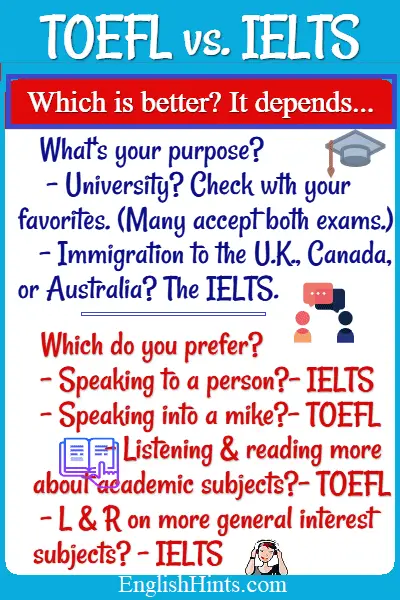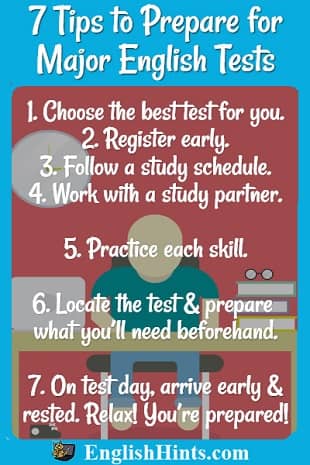English Language Test Prep
Do you need to prepare for a major English language test like the IELTS or TOEFL? Here’s the information you need, along with links to practice pages and the official sites with registration and test information.
The IELTS, TOEFL, and TOEIC are the main international English language tests.
English-speaking countries, universities, and employers use them to measure the English skills of applicants who are not native English speakers.
All three are accepted in the main English-speaking countries, and all have testing centers in countries around the world.
They each test the four language skills (reading, writing, speaking, and listening), but they test them in different ways.
There are major differences between them, so it is important to learn which is best for your purposes. (Some agencies or organizations prefer, or even require, a specific test. Find out before you register!)
Basic information about the 3 major ESL tests is below, but you should check out the links to get more information before making a decision, since each test requires a major commitment of time, effort, and money.
The IELTS
The IELTS (International English Language Testing System) is jointly owned and run by four organizations: the British Council, IDP, IELTS Australia and Cambridge English Language Assessment. It is accepted not only by universities and corporations but by the immigration departments of several countries.
There are two basic forms of the test. Both use the same Listening and Speaking sections, but they have different versions of the Reading and Writing Tests.
The Academic Test, like the TOEFL, is for people who want to study at universities or colleges in English-speaking countries. The General Training Test is for employment, immigration, or high school purposes.
One major difference between the IELTS and the TOEFL or TOEIC is that the IELTS speaking test is face to face with an examiner. It may be given on a different day than the other tests.
(In the two American tests the test-taker speaks into a microphone and his or her responses are recorded and later graded by a panel rather than a single examiner.)

The TOEFL and the TOEIC
The TOEFL is preferred by many American universities (though many also accept the IELTS, and some may only accept it. Be sure to check with the universities you are most interested in.)
It is accepted by over 9,000 universities in well over 100 countries. Its website explains the test and has information about where it is given, how to register, and how to prepare.
Good news! The new TOEFL exam, starting Aug. 2019, is 30 minutes shorter, with fewer questions in the reading, listening, and speaking sections. Even better, TOEFL now takes your best scores from each section if you have taken it before. (Several other changes make taking the test more convenient.)
The test has not changed except to slightly reduce the number of questions. The skills TOEFL is designed to test are still the same. Any practice materials you have, and any studying you have done, will still be valid.
The website offers a lot of free practice and preparation tips, including several “Inside the TOEFL test” videos on the skills tested. It also has a free online prep course you can take. (See the right column "TOEFL MOOC"-- a 'Massive Open Online Course.')
You can also download sample questions and old practice tests. To find them, click "Prepare for the Test" and scroll to near the bottom. The free practice materials are below materials with a price.
You can pay for extra help: online practice tests quite similar to their actual test, a guidebook, a 6-month subscription to an English reading improvement service, or other options.
As their reading materials point out, the best way to improve your reading skill in English is to read. Read all kinds of materials in English, and read often. You don’t have to pay for such a service to prepare for the TOEFL.
However, you might consider buying a book or service if you need help staying motivated, or if you have trouble finding materials easy enough to understand. (For reading selections, also try Online Reading and the list of readings they suggest.)
The TOEIC tests workplace English skills: understanding instructions, reading and writing emails, talking on the phone or in a conference, etc. It has separate tests for Listening and Reading, Speaking and Writing, plus several tests for beginner to intermediate English users.
The official site again has information about each test. Check it to learn how to register, how to prepare, and how the tests are scored. Like the TOEFL, the TOEIC is run by the American ETS organization (which also administers the GRE and other American examinations.)
7 Tips to Prepare for English Language Tests

1. Decide which English language test is best for you.
2. Register early to get a place at the testing center closest to you. Be sure to take a test several months before you must have the results. You need leave plenty of time for the test agency to send the results of your test to the universities, employers, or other agencies before their deadlines.
3. Make a study schedule and follow it. Use the information and practice tests provided. Pay special attention to any weaknesses you notice when you take the practice tests.
4. Find a study partner if possible, both for correction and for motivation. Celebrate your improvement, and keep studying!
5. Practice all your English skills: read a variety of materials, practice conversations, listen to lectures talks, & podcasts online, take notes, and write about them.
See the practice pages below, or, for the most effective practice, take one of the EnglishHints' test prep courses. See Mastering English Test Vocabulary for the free course on 3 Strategies for the TOEFL & IELTS, or inexpensive courses: Academic Vocabulary Lessons in Minutes a Day, Learning Prefixes, Suffixes, and Roots, or Clues to the TOEFL Reading Section.
(TED talks make excellent lecture/note-taking practice, and you can read the script later to check your understanding. Many have also been translated into other languages, so you might be able to check in your own language.
See the listening+ tests or the back issues link--both in the practice section below-- for tests on several TED talks that I think are especially interesting and useful as language practice.)
6. Before the day of your test, make sure you can find the test location. Check that you have all the identification and other papers you need for the exam. Take a snack, a sweater or jacket (test rooms may be cold), and anything else you might need.
Don’t “cram.” (That means to fill your mind with last minute review.) It’s more important to get a good night’s sleep, and maybe a little exercise or some activity that can help you relax and not stress.
7. On the day of your test, leave plenty of time to get there, find the room, confirm your identity, and get settled. Relax-- you’ve been preparing for this for a long time.
Practice for your English Language Test: Courses & Tests
You can find a lot of practice readings, tests and quizzes on this site. There are also games, puzzles, and practice activities to help you learn academic vocabulary.
For the most effective, step by step practice, take one of the EnglishHints' test prep courses:
- the free 3 Strategies for the TOEFL & IELTS Exams (See Mastering English Test Vocabulary), or inexpensive courses on
- Clues to the TOEFL Reading Section.
To practice for the listening and (academic) reading tests see also Comprehension Exercises
OR individual pages:
- and the free worksheets on the Reading Comprehension Worksheets page, as well as the worksheets in the Whales and Teen Sleep lesson plan pdfs on the Reading Comprehension Lesson Plans page
For the listening or reading test see the comprehension quizzes and tests listed in Listening and Reading Comprehension Exercises (tests based on talks with transcripts, so you can practice listening, reading, or both), especially
- and (Listening or) Reading Comprehension Test on Where Ideas Come from
To prepare for the writing test see
- TOEFL or IELTS Essay Sample (for IELTS academic writing task 2 or TOEFL task 2),
- Charts and Graphs (for the IELTS academic writing task 1),
- Writing Test Vocabulary: (understand exactly what test prompts are asking)
See Essay Writing Practice for the most important essay writing tips (and practice exercises for a small fee if you're interested in more.)
See the TOEFL ibt Speaking Test for information on the new version of that section (with 4 questions instead of 6) and for preparation hints & practice links.
Try Some Quizzes
See ESL Quizzes & Tests with quizzes including
- Academic Vocabulary Test 1 and its Gapfill (both level 1-5 of the AWL), and
Finally, you can find pages on English skills (writing, reading, listening, & speaking-- as well as grammar, vocabulary, & more) using the EnglishHints' sitemap. The English Detective back issues link to some excellent readings and talks on a variety of subjects. They are designed to practice the vocabulary you will need for academic study in an English speaking country.
Didn't find what you
needed? Explain what you want in the search box below.
(For example, cognates, past tense practice, or 'get along with.') Click to see the related pages on EnglishHints.
| site search by freefind | advanced |









